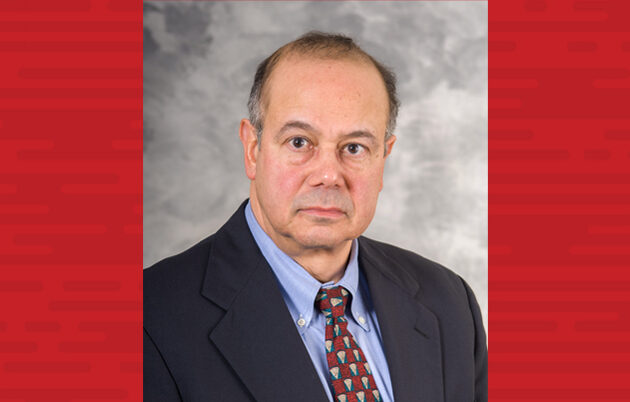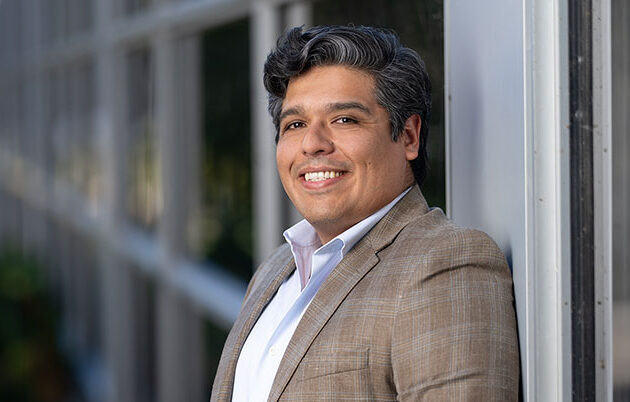From Summer Scholars to Physician-Scientists
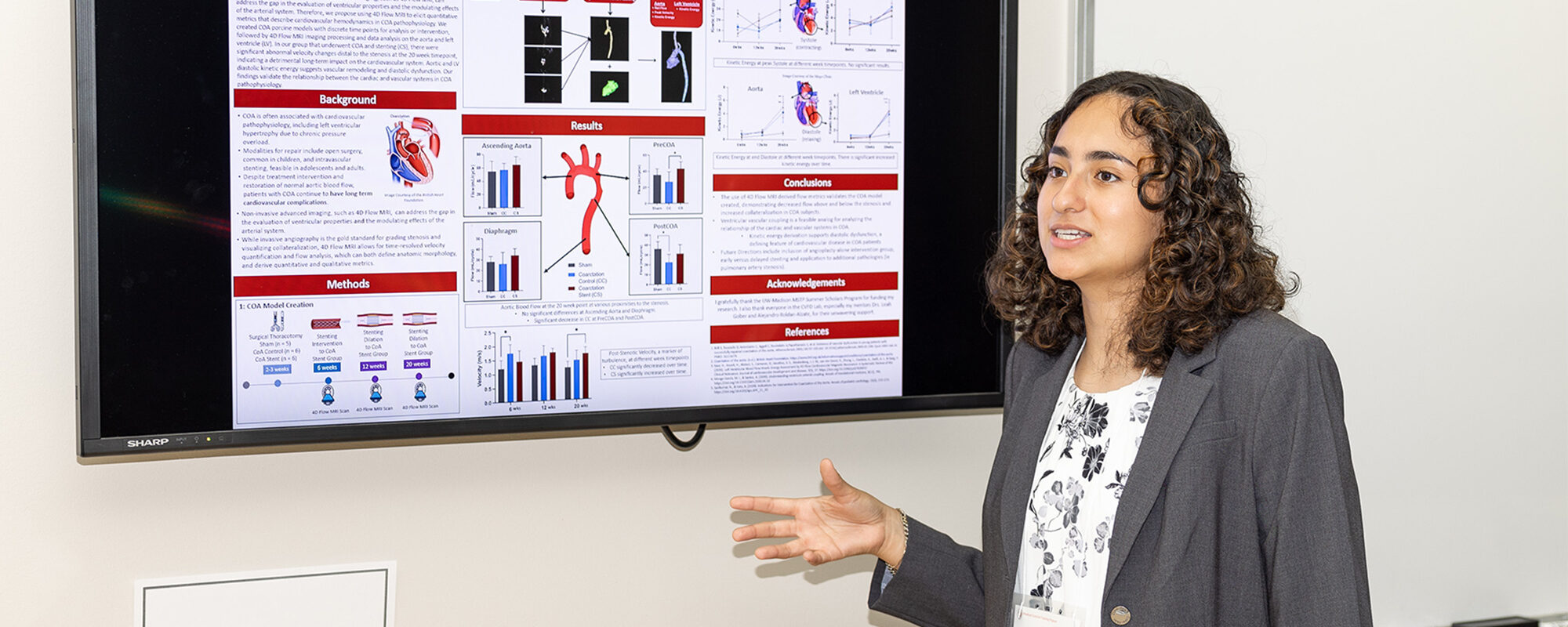
In summer 2024, nine undergraduate students trekked to the University of Wisconsin School of Medicine and Public Health (SMPH) to gain experience in research laboratories.
Rigorously selected to participate in SMPH’s Summer Scholars program, they came from colleges and universities in Washington, D.C., Connecticut, New York, Florida, Missouri, Minnesota and California. The students dedicated 10 weeks to investigations alongside faculty mentors, laboratory staff, and medical and doctoral students in fields such as immunology, neuroscience, oncology, and virology.
The Summer Scholars program is hosted by the Medical Scientist Training Program (MSTP), which grants combined MD-PhD degrees. While many scholars plan to pursue both medical and doctoral degrees, others only recently learned that the combined degree program is an option at some universities.
For instance, Miguel Pereira — now completing his final year of a neuroscience degree at Fordham University in New York City — learned about MSTP and the Summer Scholars program when he attended the 2023 conference of the Society for Advancement of Chicanos/Hispanics and Native Americans in Science, commonly referred to as SACNAS, in Oregon.
“I knew I wanted to pursue medicine, but I was not sure of the specifics. At the SMPH booth, I spoke with an MD-PhD student, Monica Duran, who described the dual-degree program. It sounded amazing! I have known physicians who did research, but I thought I would have to pick an MD or a PhD. Monica spoke highly about her experience in MSTP. I was thrilled to get accepted to the Summer Scholars program,” said Pereira, who plans to take two gap years after graduation to continue working in research and as an emergency medical technician (EMT) as he refines his plans. He hopes to incorporate medicine, research and EMT work into a future career; he also has an interest in public health.
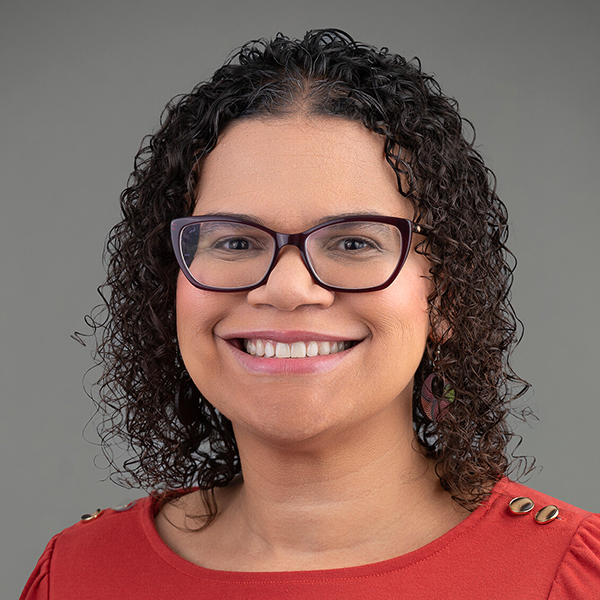
Like Pereira, Elizabeth Felton, MD ’09, PhD ’07, faculty director of the Summer Scholars program, participated in undergraduate programs that helped shape her career, but she did not learn about MD-PhD programs until later in her journey. She earned a doctorate in biomedical engineering from the UW College of Engineering and her medical degree from SMPH. Before she joined the faculty of both UW–Madison schools, she completed a neurology residency and epilepsy fellowship at Johns Hopkins Hospital in Baltimore, Maryland. She now focuses on her role as an associate director of MSTP, plus clinical duties and research focused on ketogenic diets as a treatment for adults with neurologic conditions.
“One of our goals with the Summer Scholars program is to increase the number of people from backgrounds underrepresented in the sciences and medicine. We promote this offering to undergraduate students, particularly those who attend smaller institutions that do not have the research resources we have at UW–Madison,” said Felton, who was charged with developing the program when she became an MSTP associate director in 2019.
Formative Experiences
Over the summer, Pereira worked in the laboratory of Jane E. Churpek, MD, MS, associate professor, Division of Hematology, Oncology, and Palliative Care, Department of Medicine. Churpek’s lab focuses on how exposures interact with inherited genetic variations to increase someone’s risk of developing blood disorders and/or cancer.
Pereira recalled, “Dr. Churpek gave me the resources, but she left the research up to me, with guidance from MSTP student Rachel Kirchner and others in the lab.”
Noting that he was impressed with the open floor plan of the Wisconsin Institutes for Medical Research, where most Summer Scholars were based, Pereira said, “There are many labs in the same hallway, and other principal investigators would come talk with Dr. Churpek and introduce themselves to me. The attitude was welcoming.”
He added that the Summer Scholars program exceeded his expectations.
“For instance, I did not expect the level of career development and shadowing opportunities we got. It provided a taste of the real world I will be entering.”
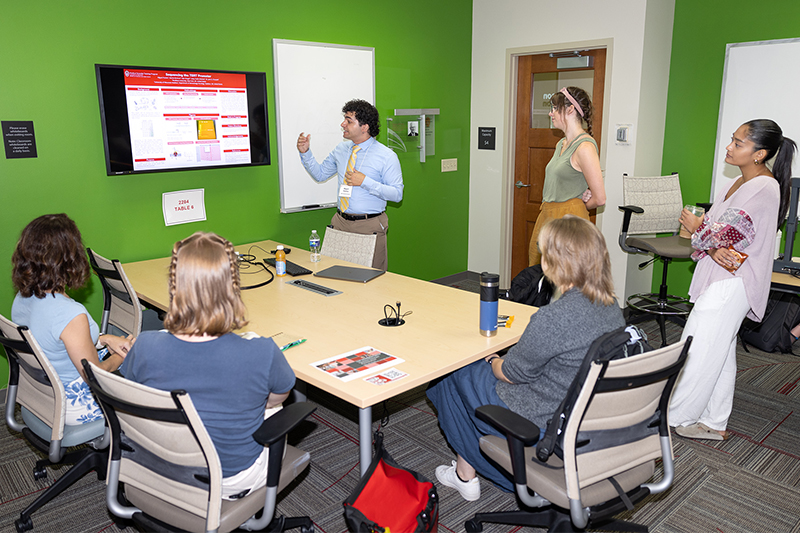
According to Churpek, mentoring Summer Scholars is a great way to help passionate students get key experience.
“My students get to see how we go from a patient at the bedside to using samples for genetic research, with the goal of improving patient care,” she said. “These formative experiences help people test whether this is something they want to pursue. Working with a mentor also can be a foot in the door for other opportunities, letters of recommendation, and knowledge of how to get into various fields.”
Churpek said that students ask great questions, bring “tons of enthusiasm,” and provide an opportunity for others in the lab to learn to mentor.
Another faculty mentor — Alejandro Roldán-Alzate, PhD, an associate professor in the SMPH Department of Radiology and the UW College of Engineering — said he was amazed with the quality of the undergraduate students and the type of work they are able to conduct.
“In the case of the student in my lab, Jeprika Rodriguez, I was greatly impressed with her ability to interact with lab members related to medical and engineering topics within the project,” said Roldán-Alzate.
Rodriguez is completing a bachelor’s degree in biochemistry at the State University of New York at Stony Brook. In Roldán-Alzate’s lab, which focuses on cardiovascular fluid dynamics and image-based modeling of cardiovascular flows, she collaborated with a post-doctoral fellow to process sophisticated magnetic resonance imaging data sets from an animal model of aortic coarctation.
“The most exciting part was being able to connect with so many people about common interests,” she said. “I love hearing about people’s experiences in their research and clinical fields and what drives those passions. Being at the intersection of medicine and research allows for such a broad opportunity to engage with numerous communities and offer a unique, multifaceted perspective.”
Prior to applying to summer programs, Rodriguez knew she wanted to explore her interest in the MD-PhD pathway.
“There are very few programs across the nation that offer this type of summer experience to undergraduates,” she said. “I wanted to attend a program that would allow me to conduct research and gain clinical experience by shadowing physician-scientists.”
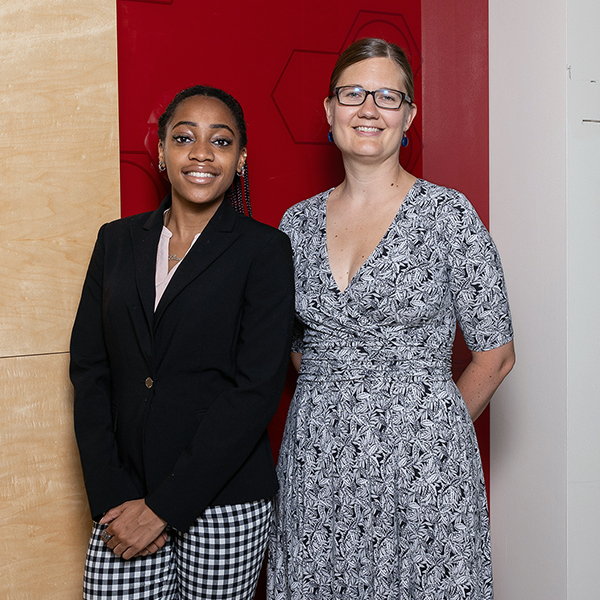
Eliana Peyton, who is working on a neuroscience degree at Yale University in New Haven, Connecticut, appreciated the opportunity to shadow her faculty mentor — Emma Mohr, MD, PhD (PG ’18), assistant professor, Division of Infectious Diseases, Department of Pediatrics — in clinical and laboratory settings. Peyton gained experience in both, while thinking about ways to create a healthy balance of clinic-to-lab time in her future career.
In addition, Peyton, who had never been to the Midwest, said she enjoyed her time exploring the UW–Madison campus, including the Lake Mendota shoreline.
Another mentor-student pair is Corinna Burger, PhD, associate professor, Department of Neurology, and Diane Fakinlede, an undergraduate majoring in biology with minors in psychology and chemistry at Howard University in Washington, D.C.
Fakinlede learned about the MSTP Summer Scholars program while attending the Advanced Undergraduate Institute at Stanford University in California. However, the self-described “big city person” had a preconceived notion that Wisconsin would be too rural for her taste.
“People told me great things about UW–Madison, and that relieved some of my concerns. Now, my feelings have turned around 100 percent,” said Fakinlede, who plans to pursue MD and PhD degrees.
Reflecting on a Summer Scholars assignment to read chapters in a book about navigating graduate studies as someone from a community that is experiencing health disparities, Fakinlede observed, “Usually, that is not a conversation being held, but the fact that Dr. Felton had that conversation, and we had a healthy discussion about it, I started thinking more about the social and academic aspects of being in these spaces. I really appreciated that.”
In the Burger lab, Fakinlede’s research helped characterize phenotypes of a rat model that can express human-like tau proteins related to Alzheimer’s disease; her previous research related to Parkinson’s disease. She was named a 2024 Astronaut Scholar through the Astronaut Scholarship Foundation, which funded her trip to Texas to present her UW–Madison research at a conference.
“I was the only person who presented Alzheimer’s disease research, and many people talked to me about their family members who are affected by the disease,” said Fakinlede. “It was humbling, and it motivated me to continue doing research. I am grateful for everything I have achieved and the people who helped me get here.”
They all want to help us succeed, whether or not we enroll in an MSTP.
- Miguel Pereira, Summer Scholar
Noting that she appreciated the support from leaders of the Summer Scholars program, including Felton and the MSTP co-administrators, Janna Boehm, MEd, and Jenny Schroeder, MLIS, Fakinlede said, “When I began the program, I was studying for my Medical College Admission Test, and everyone understood how hard that was.”
In Madison, she celebrated completion of that test and her 21st birthday. Additional celebrations ensued following the Summer Scholars’ final day at SMPH, when they shared posters and presentations with MSTP faculty members, mentors, and others.
Networking Opportunities
Over four years, 41 Summer Scholars have forged deep connections with each other and with people at SMPH, Felton noted. She keeps in touch with all scholars, who are welcome to reach out to program leaders and mentors at any time. Many MSTP students volunteer as peer mentors, and three organized events so scholars could mix with others in the program.
Rodriguez said she enjoyed the close interaction with MSTP students.
“We learned from them at professional development sessions and got to know them in weekly social activities,” she said. “I also had many opportunities for meetings with Dr. Felton, my faculty mentor, and an MSTP peer mentor. I loved having people I could reach out to for feedback.”
Pereira observed, “They all want to help us succeed, whether or not we enroll in an MSTP. Our cohort of nine Summer Scholars also had a good dynamic.”
Fakinlede said the program taught her the importance of having a community and that “it is okay to not know everything, and to ask for help.”
Next Generation
Mohr, who has been a mentor for three Summer Scholars, noted that she was drawn to mentoring students from backgrounds underrepresented in science to help shape the next generation of physician-scientists.
“My mentees have had positive things to say about how their experience as Summer Scholars has helped shape their careers,” said Mohr.
Felton agreed that the summer program is a great opportunity to showcase what UW–Madison has to offer.
“We hope some scholars choose our MSTP, but we realize they can go anywhere,” she said. “In any case, they may return here for residencies, fellowships, or faculty positions.”
Felton is proud that two past Summer Scholars entered SMPH’s MSTP in August 2024.
“It gives me joy to show undergraduates this career option, and to see some of them going into this field!” she said.
Peyton, Pereira and Fakinlede reinforced Felton’s words with their own reflections. Noting that she made deep connections that will last a lifetime, Peyton said, “I have decided to embark on the long journey of getting my MD-PhD in neurosurgery and neuroscience!”
Pereira returned to New York City with a revitalized love for research. Combining what he learned in his neuroscience lab at Fordham with what he experienced at UW–Madison has transformed his perspective, he said.
“I know I want to continue research, and I realize I have so many options, including ways I could incorporate my public health interest into my career,” Pereira said.
Fakinlede intends to take a gap year, and then pursue an MD-PhD in neuroscience.
“Honestly, I feel like the world is my oyster,” she said.
